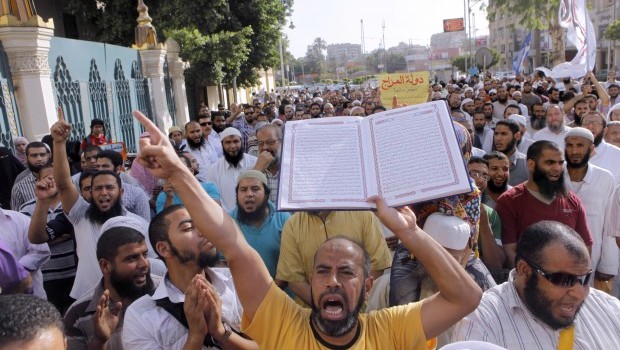
An Egyptian Salafi shouts anti-Mohammed Morsi slogans and holds a copy of the Muslim holy book, the Quran, in support of bearded police officers, who were prevented from carrying out their work in the interior ministry, during a protest in front of the presidential palace in Cairo, Egypt, Saturday, June 1, 2013. Source: AP Photo/Amr Nabil
Cairo, Asharq Al-Awsat—Salafist leaders in Egypt called for an urgent meeting to discuss the recent escalation of tensions between their followers and the Muslim Brotherhood following the recent detention of a Salafist politician.
It will also consider taking legal action against the body responsible for the arrest of Sheikh Yasser Borhami, the founder of Salafi Dawah, who was detained at Borg El Arab Airport in Alexandria on Thursday while returning from Umrah, thanks to his presence on on a watch list.
Observers say that the incident has inflamed conflict between the Brotherhood and the Nour Party, the political arm of Salafi Dawah.
Salafi leaders that spoke to Asharq Al-Awsat expressed their fears that Borhami’s arrest is the beginning of a return to the involvement of the national security forces (previously the State Security Investigations Service) in politics.
The Salafi Dawah group said in a statement that Borhami was surprised when, on his return from Saudi Arabia, he found his name on a watch list, and was detained by airport security for a lenghty period. He also had his passport unlawfully withdrawn. “When Borhami asked for the reason of his placement on a watch [list], they said ‘it is not our specialty,’” the statement said.
Dr Hashem Abu Nasr, a member of the administration council of the Salafi Dawah, said that they do not yet know what authority is responsible for the arrest of Borhami. He added that “we want to know if this move was intended to escalate the dispute between the Brotherhood and the Salafists, and if there are authorities within the state that have an interest in corrupting the relationship between the two sides.”
He also said that Egyptians are aware that “we are still ruled by a deep state,” a reference to national security officials still in office from the Mubarak era.
Abu Nasr, the former general secretary to the Nour Party, also told Asharq Al-Awsat that “we reject this measure in [both its] form and substance . . . we are addressing [our] contact with the presidency, and its consideration as the highest body of responsibility in Egypt, after a meeting of the Salafi Dawah leaders to clarify the position.”
This is not the first time that a Salafi Dawah leader has been arrested at Egyptian airports. In the past month, authorities at Cairo airport arrested Amr Makki, the Nour Party’s Assistant President of Foreign Affairs. This is in addition to the state security’s continued questioning and detention of human rights activists traveling to or returning from foreign countries.
Observers attributed Borhami’s dentention to his attack on policies implemented by the Muslim Brotherhood and President Mursi, and recent signs of a rapprochement between Salafist and liberal leaders.
Dr Younes Makhioun, president of the Nour Party, demanded that the Minister of the Interior, General Muhammad Ibrahim, re-evaluate the airport watch lists. Dr. Abdullah Al-Badran, head of the parliamentary bloc of the Nour Party’s Shura Council, said that he would submit an urgent request to question the interior minister.
The arrest of Borhami also drew fire from human rights activists and non-Salafists. Hafez Abu Sa`da, director of the Egyptian Organization for Human Rights, said that the detention of Sheikh Yasser Borhami at Borg El Arab airport is a restriction on the opposition movement as a whole.
Yasser Hassan, a member of the supreme authority of the Wafd Party, said that the harassment suffered by Sheikh Borhami demonstrated the dictatorial approach of the Muslim Brotherhood, and said that he expects to see an increase in the divide between the Muslim Brotherhood and the Salafi Dawah over the coming period.
Speaking to Asharq Al-Awsat, he accused Egypt’s Muslim Brotherhood of engaging in arbitrary and repressive measures against political opponents since their arrival to power. This act, he added, is a sign of a split and a clear contrast between the Muslim Brotherhood and the leaders of the Salafi Dawah, especially after the Salafists’ perception that the Muslim Brotherhood was attempting to control and dominate all institutions of the Egyptian state, and rule by themselves.
The Muslim Brotherhood denied accusation that the group was behind the arrest of Borhami. Dr. Arif told Asharq Al-Awsat: “We have not yet arrived at the truth of what really happened with Sheikh Borhami.”
He said that it was likely that what happened at the airport was due to the fact that Egypt’s security agencies continued to work with old records. They are still accessible on computers that were in use before the revolution and have not been cleared up, he said.
He pointed out that many of the Islamists were at the top of the lists made by the state security apparatus under Mubarak. Arif said that he believes that the authorities should clear up the records, and that some of the things that are left over from the period before the revolution be amended.
He added that he himself had been detained at Cairo airport some weeks ago, because of these records.

Trackbacks/Pingbacks